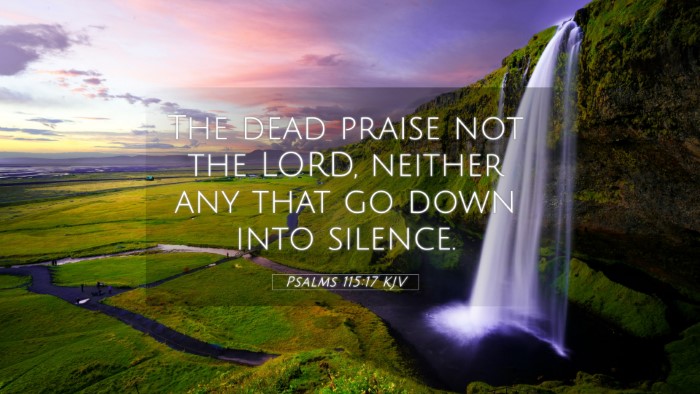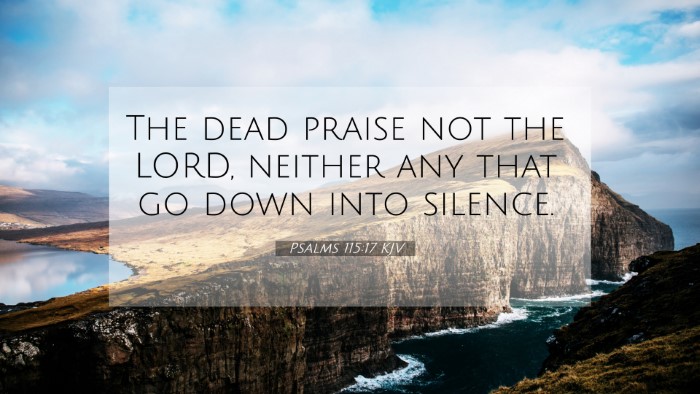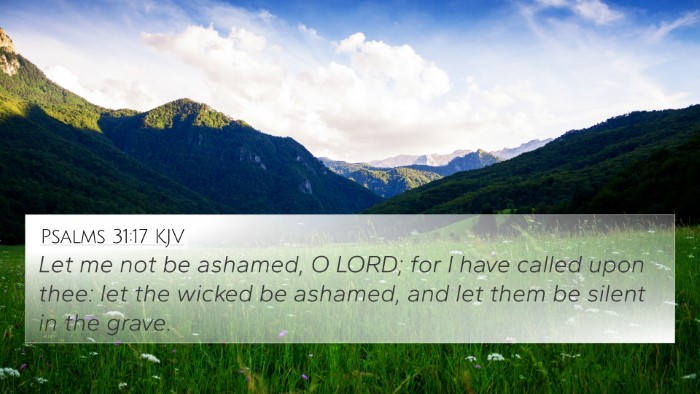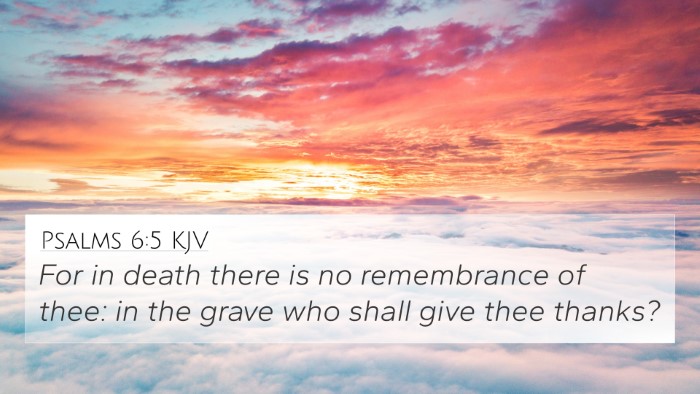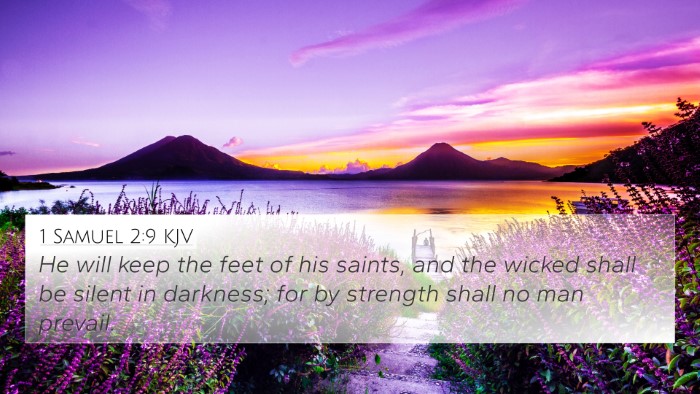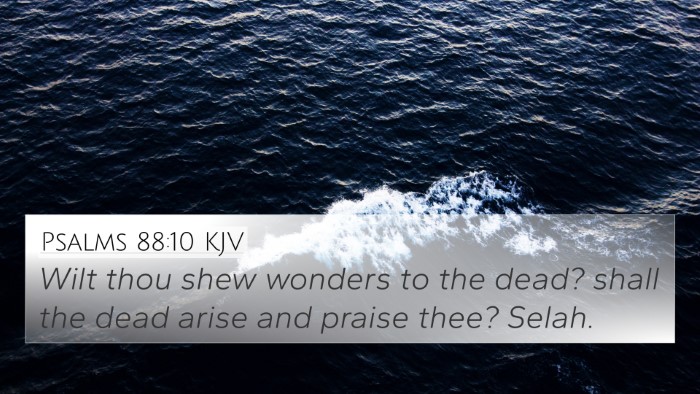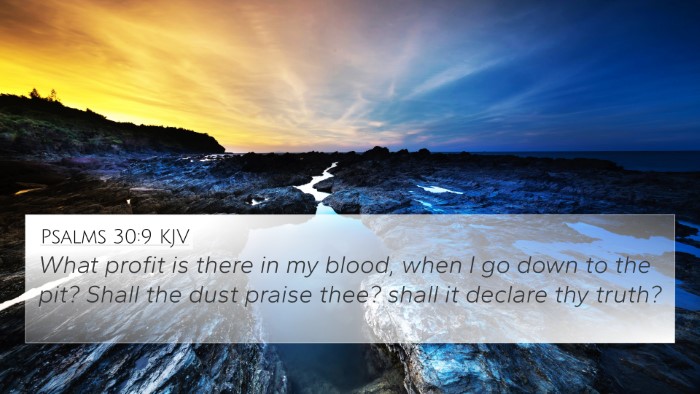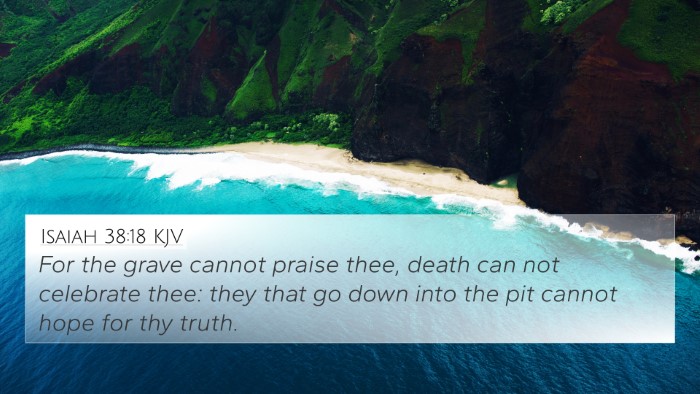Understanding Psalms 115:17
Psalms 115:17 states: "The dead praise not the Lord, neither any that go down into silence."
This verse emphasizes the importance of life in worship and praise to God. The concept presented here is profound, affirming that the ability and opportunity to glorify God lie within the realm of the living.
Commentary Insights
Matthew Henry Commentary:
Matthew Henry expounds on this verse by highlighting that the absence of the dead in the act of praise serves as a powerful reminder to the living of their responsibility to worship. According to Henry, those who have passed on are no longer capable of singing hymns or expressing gratitude toward the Creator. He encourages the living to take up this responsibility with vigor.
Albert Barnes Commentary:
Albert Barnes notes that the psalmist contrasts the living with the dead to accentuate the privilege of being alive, which allows individuals to engage in acts of praise. He emphasizes that this verse serves as a call to cherish the life given and to utilize it for glorifying God. Barnes interprets this silence of the dead as a metaphorical insight into the reality of death, where all earthly activities cease.
Adam Clarke's Commentary:
Adam Clarke elaborates on the notion of silence in death, suggesting that the psalmist likely alludes to a state of being entirely removed from God's praises. Clarke emphasizes the theological implications of this verse, pointing out that worship is inherently a function of the living, which reinforces the significance of life in spiritual practice.
Key Themes and Connections
This verse can be interpreted through various biblical themes and connections:
- The Importance of Worship: The verse highlights the crucial nature of worship in life.
- Life and Death: It outlines a distinct separation between the living and the dead in their abilities to honor God.
- Hope and Praise: Emphasizing the necessity of praising God while there is still breath in one’s lungs.
- The Nature of God’s Creation: Understanding that life is a unique gift that demands recognition and glorification of the Creator.
Cross-References
This verse has several biblical parallels and connections that can be explored:
- Isaiah 38:18-19: "For the grave cannot praise thee, death can not celebrate thee: they that go down into the pit cannot hope for thy truth."
- Ecclesiastes 9:5-6: "For the living know that they shall die: but the dead know not any thing, neither have they any more a reward; for the memory of them is forgotten."
- Psalms 146:2: "While I live will I praise the Lord: I will sing praises unto my God while I have any being."
- Revelation 21:4: "And God shall wipe away all tears from their eyes; and there shall be no more death, neither sorrow, nor crying, neither shall there be any more pain: for the former things are passed away."
- Psalms 30:9: "What profit is there in my blood, when I go down to the pit? Shall the dust praise thee? Shall it declare thy truth?”
- 1 Thessalonians 4:14: "For if we believe that Jesus died and rose again, even so them also which sleep in Jesus will God bring with him."
- John 5:28-29: "Marvel not at this: for the hour is coming, in the which all that are in the graves shall hear his voice, and shall come forth; they that have done good, unto the resurrection of life; and they that have done evil, unto the resurrection of damnation."
Thematic Connections
Exploring the thematic connections within the scriptures can enrich the understanding of this verse:
- Worship and Praise: The necessity of giving thanks and praises to God can be seen throughout the Psalms.
- Life after Death: Numerous scriptures discuss the reality of life beyond this earthly existence.
- Commemoration of the Faithful: The Bible frequently reminds believers of the lives lived before them as motivators to praise God.
Comparative Bible Verse Analysis
The art of cross-referencing Biblical texts reveals deeper meanings and insights:
Through comparative studies, one can note how various scripture passages from both the Old and New Testaments align with the message of Psalms 115:17. Such comparative analysis serves to unite believers' understanding of God's desire for praise from the living and the eternal implications of worship.
Tools for Bible Cross-Referencing
For those interested in studying cross-references further, several tools are available:
- Bible concordances help identify relationships between verses.
- Bible cross-reference guides provide structured approaches to scriptural studies.
- Online Bible reference resources facilitate ease of finding relevant scriptures.
Conclusion
Psalms 115:17 stands as a poignant reminder of the value of life in worship. As living beings, the duty to honor God through praise rests upon us. By comprehending and cross-referencing with other scriptures, a fuller perspective emerges on the importance of living out our faith through worship. Utilizing resources and methods in Bible study allows for a deeper engagement with the text and aids in discovering rich inter-biblical dialogues.

